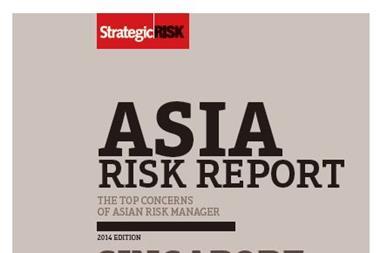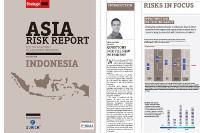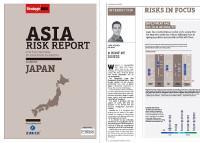Hong Kong authorities have been implementing regulatory changes, with an even stricter regime likely to emerge in coming years, but the territory’s close ties to mainland China mean that it is highly dependent on its big brother’s moves and plans
Increased regulation from the authorities is a pressing concern for risk professionals operating in Hong Kong. For example, the territory’s new Companies Ordinance came into effect in March, which executive director of Willis Hong Kong Lincoln Pan says is a precursor to further change. “With the new regulation, any registered company in Hong Kong must have a natural person in Hong Kong as a board director,” he says. “We will see
greater personal risk and liability for directors of public companies - we will see regulation that holds directors directly accountable for improper financial reporting and improper related party transactions.”
Aon Asia’s chief executive for greater China Owen Belman advises that directors and officers in Hong Kong must “fulfil their duties to exercise care, skill and diligence as these are now codified in the ordinance”. “More
resources should be invested to raise the standard of corporate governance of, and providing protection to, the corporations, including more training to directors, as well as ensuring that adequate directors’ and officers’ insurance is purchased,” he says.
Pan agrees that scrutiny of, and regulatory demands for, Hong Kong-based executives will increase in coming years. “Hong Kong has maintained a strong standard of corporate governance in Asia and the government has sought through regulation to maintain appropriate standards for financial transparency and regular disclosures from private and public companies,” he says. “The Hong Kong Stock Exchange in particular should be commended for its constant and increased scrutiny of public companies. The next phase of development for
Hong Kong is to create greater accountability and potential liability on directors of public or private companies who act improperly or inconsistently with their duty of care.”
EY Asia-Pacific fraud investigation and dispute services leader Chris Fordham believes that, in the past year, Hong Kong has shown that it is “committed to finding ways to improve the corporate governance of its financial
markets”. “In October 2013, the Hong Kong Exchanges and Clearing implemented stricter rules for companies listing in Hong Kong,” he says. “The Financial Services Development Council also announced in 2013 that it is continuing to seek ways to improve the city’s financial markets.” Asia editor for Thomson Reuters Accelus Compliance Complete Trond Vagen notes that Hong Kong has seen a steady crackdown on insider dealing and market manipulation in the past years, “with the Securities and Futures Commission taking a
bolder enforcement approach, among others pursuing criminal prosecution against wrongdoers and seizing the assets of foreign hedge funds”.
A tougher regime
Although a move is undoubtedly taking place towards a stricter corporate governance regime, particularly in relation to Hong Kong’s efforts to attract international investors, some analysts fear that the process is disjointed and lacks focus. Furthermore, the nature of the ownership and/or shareholding of many companies
means that the transparency associated with many aspects of governance can sometimes be resisted. Freedom and the rule of law are two of Hong Kong’s strengths, but Kevin Rookes, risk and safety manager at Hong Kong Aero Engine Services, says “one could question the current pace of development and the lack of government efficiency”. “The current chief executive does not have the support of the legislature, hence government bills and budget are being blocked,” he laments.
Another possible problem area is privacy regulations, which Fordham says are falling behind as new technologies emerge. “Today’s privacy regulations seem inadequate to protect individuals from the privacy risks that emerging technologies present”, he says. Vagen points out that Hong Kong recently introduced new
legislation on personal data and privacy protection that restricts how financial institutions can use personal data for marketing and commercial purposes. “The Personal Data (Privacy) Ordinance even imposes a measure of criminal liability, but perhaps more importantly for financial institutions is the issue of customers’ trust and the lack of trust that is caused when an institution’s reputation is affected following revelations of misconduct,” he says.
Pan says that a major influence on the regulatory landscape will be how China monitors and ensures proper compliance with international taxation of Chinese nationals and companies. “Hong Kong will likely see the first
wave of scrutiny, with companies in Hong Kong being held responsible to some degree for the appropriate taxation of their Chinese employees,” he predicts. “How China pushes regulation of Hong Kong financial institutions to ensure appropriate disclosure of offshore wealth and offshore earnings could be a major shift in regulator standards and risk for companies operating in Hong Kong.”
Follow the money
Where and how China directs its economic strength will affect Hong Kong in coming years. As risk and business continuity managerat Veolia Water Lenny-Baptiste Conil says, most of the money flowing through
Hong Kong is coming from or going to mainland China. “Therefore Hong Kong, being China’s port of entry to the outside world, is affected by all major policies decisions in China,” he says. “It is debatable whether it is a
Western country with Chinese rules or a small China with Western rules, but one thing is for sure: Hong Kong is closely nestled under China’s wingspan.”
Belman says that the Chinese government has implemented several policies that have benefited Hong Kong economically, the most notable being the ‘individual visit scheme’, which has brought an influx of mainland tourists into Hong Kong, fuelling the growth of retail industries in the past decade.
“More recently, the financial market, issuers and investors in Hong Kong are getting excited over the connection of Hong Kong and Shanghai bourses before the end of this year,” he says. “On the other hand, the Chinese government may also take action to slow the Hong Kong economy down.” Belman reports that
some believe the move of APEC ministerial meeting in September 2014 from Hong Kong to Beijing was a response to potential actions taken by Hong Kong’s pro-democratic camp relating to the discussion on political reform.
“Many also believe the Chinese government could leave Hong Kong out from its long-term national economic development plans,” he says. “The Chinese government can also indirectly affect companies operating in Hong Kong through issuing policies and directives to companies located in mainland China whose parent companies, subsidiaries, suppliers or customers of companies are operating in Hong Kong.”
View from the mainland
Pan believes there are several areas in which the shifting political dynamics in China will affect Hong Kong. One is the gap between the Chinese renminbi and the Hong Kong dollar, which Pan forecasts to increase in the coming years, creating inflation risk in Hong Kong and purchasing pressures for Hong Kong-based firms procuring from China. “The currency gap will further affect the ability of Hong Kong companies to attract and retain mainland Chinese talent at appropriate salaries,” he says.
Of even more concern are the shifting employment dynamics in China and the rising cost of retaining and acquiring talent. Pan believes these are “probably the largest economic risks to Hong Kong companies”. “The
exchange rate, combined with a war for talent in China, are seeing Hong Kong companies struggle to attract and retain blue- and white-collar talent in China,” he explains.
“As the Chinese government pushes manufacturing away from commodity, low-end manufacturing and with the growth and expansion of the service industry, the compensation expectations are dramatically shifting and will put pressure on Hong Kong companies operating in China.” The flexibility of travel into Hong Kong and Macau also dramatically affects the Hong Kong economy, Pan says. “So much of Hong Kong’s and Macau’s economies are now structured around the tourists and visitors to the region and any change, positive or negative to travel policies will dramatically affect them,” he says.
Indeed, most large corporates in Hong Kong are deeply exposed to the shifting demands of Chinese consumers and the economic growth of mainland China. Manufacturing and export dynamics are changing and companies would be well advised to keep a close eye on their investments, partnerships and growth expectations in China.




















No comments yet